Protracted and Complex Refugee Challenges: The Roles of Development Agencies
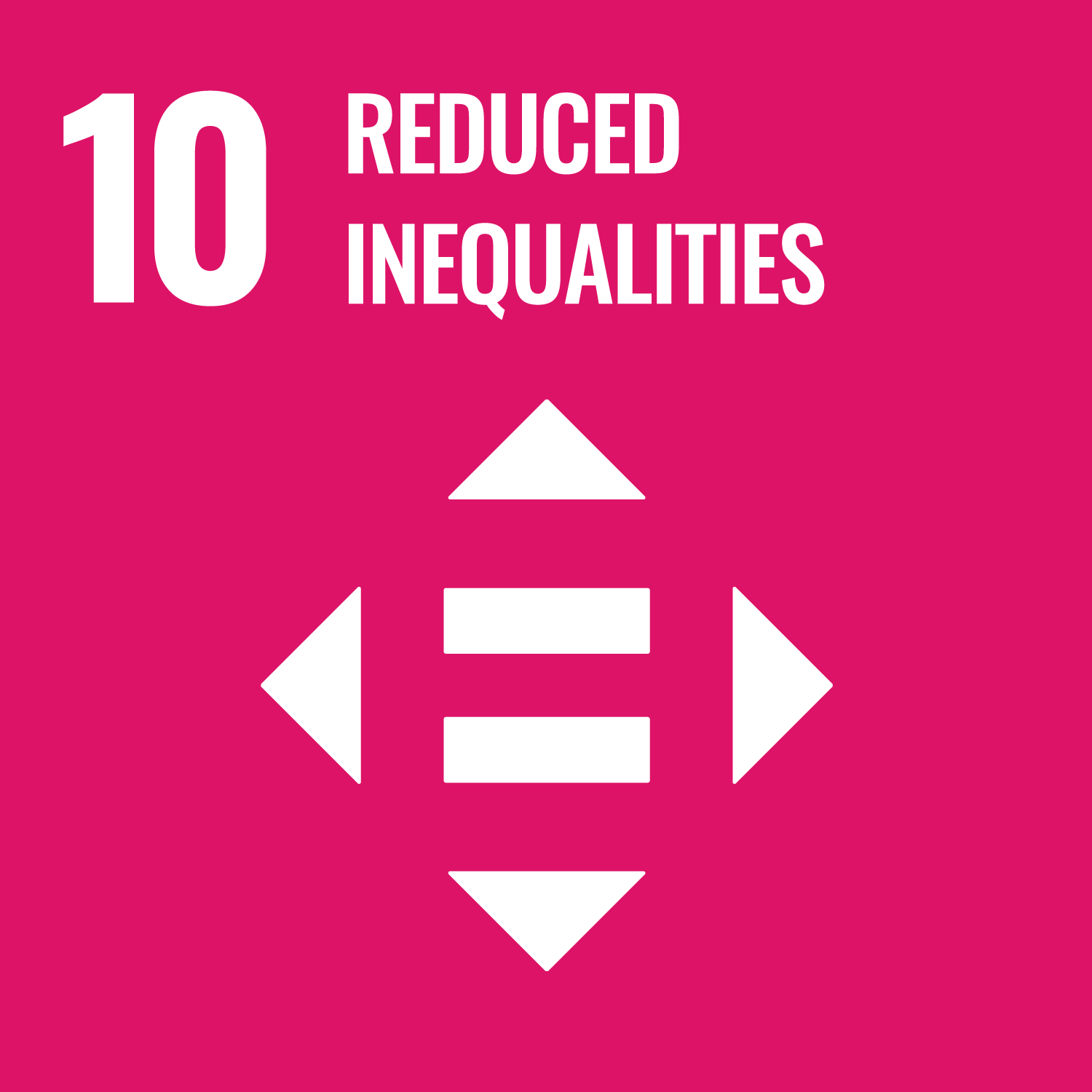
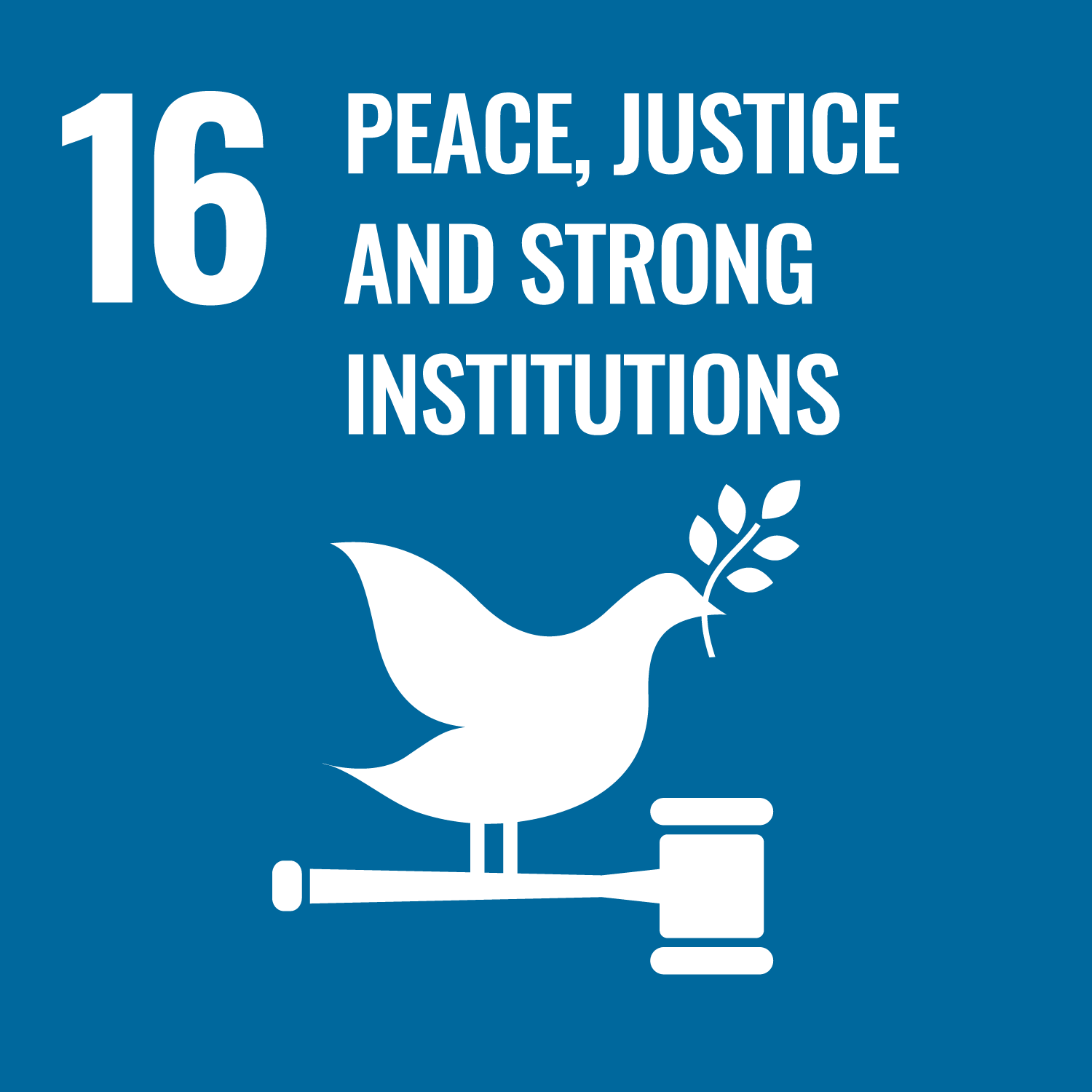

2024.02.01
The term “refugee” has been showing up more frequently in the news, due to the increasing number of humanitarian crises, notably the Israeli-Palestinian conflict and the tragedy unfolding in Ukraine. There has been an increase in the number of refugees as a result of these protracted conflicts and political instability, and factors such as climate change are making the crisis even more complex and severe. At the second Global Refugee Forum (GRF) held in December 2023, JICA President Tanaka Akihiko called for the further expansion of cooperation among humanitarian assistance, development cooperation, and peace efforts. This article will consider these increasingly protracted and complex refugee challenges and future directions for cooperation.
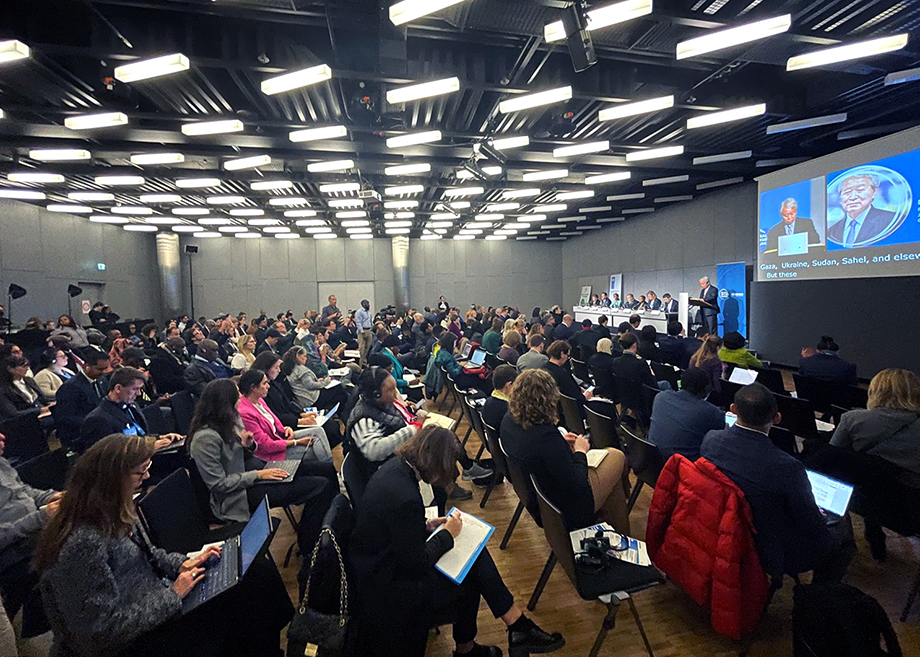
JICA President Tanaka took the stage at a high-level event at the second Global Refugee Forum.
According to the Office of the United Nations High Commissioner for Refugees (UNHCR), the number of refugees and internally displaced persons forced to flee their homes due to conflict and persecution surpassed 114 million at the end of September 2023. The number has therefore more than doubled over the past decade. Some 66 percent of current refugees have suffered protracted displacement over more than five years. Many refugees (about 75 percent) are forced to leave for mostly low- and middle-income neighboring countries where it is easier to find refuge. As the long-term stay of refugees leads to a heavy burden on host countries, the international community needs to share this burden and work together to support both the refugees and the host countries and communities.
The GRF is the world’s largest international conference on refugee issues. It is held every four years with the principle of participation by the “Whole of Society” and is attended by representatives of government agencies, private companies, NGOs and civil society, as well as refugee representatives from around the world. While sharing their experiences and knowledge, the attendees discuss ways to improve the situation for refugees and submit their pledges and intended contributions to solving the problems of refugees. The second GRF was held in Geneva, Switzerland, from December 13 to 15, 2023, under the auspices of UNHCR and the Swiss government. Japan was among the co-convenors of the event, along with Colombia, France, Jordan, and Uganda.
JICA President Tanaka Akihiko, speaking at one of the forum's high-level events, made a strong appeal to the audience. “Humanitarian crises are escalating and cannot be addressed by emergency humanitarian aid alone,” he said. “Development and peace actors need to join forces with humanitarians.” The forum saw the launch of initiatives, including “Supporting integrated development planning that incorporates refugees’ demands” and “the secondment of experts to the host governments and refugee authorities for their promotion of the Humanitarian-Development-Peace Nexus (HDP Nexus).*” The importance of the HDP Nexus was emphasized at the first GRF in 2019, and this time, the need to expand cooperation to support the refugee-hosting countries was highlighted so that they can take the lead in coordinating the diverse stakeholders.
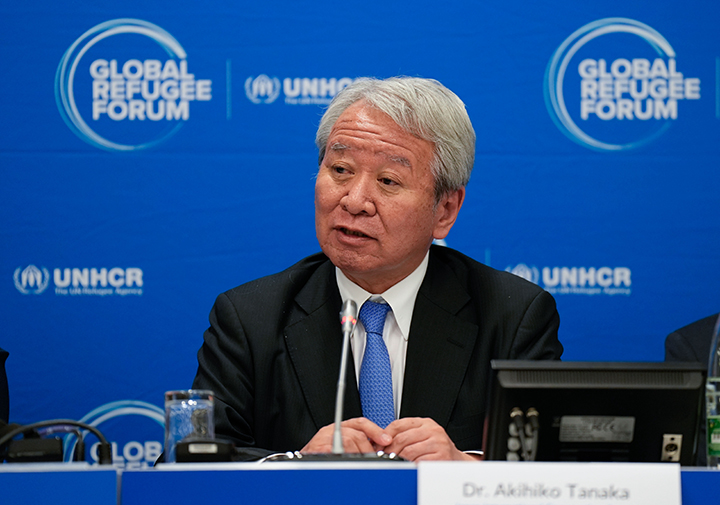
JICA President Tanaka Akihiko speaking at one of the forum's high-level events.
*Humanitarian-Development-Peace Nexus (HDP Nexus)
This is an approach in which actors from diverse fields are encouraged to work together to respond to various issues including those related to refugees. This involves providing “humanitarian assistance" in response to urgent needs, providing "development cooperation” to support refugees' self-reliance and reduce the burden on host countries in the long term, and promoting peace operations aimed at resolving and preventing conflicts, which are the root cause of population displacement.
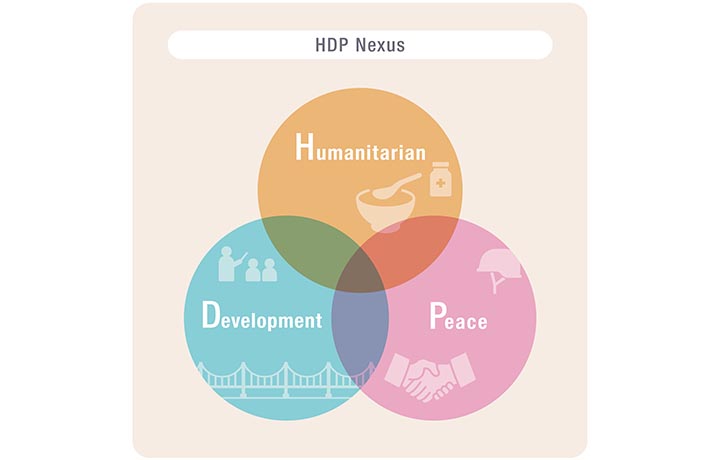
Senior Director Murotani Ryutaro of the Office of Peacebuilding in JICA's Governance and Peacebuilding Department, also took part in this year's GRF.
“The refugee crisis is now worse than it was four years ago, when the first forum was held, with crises on the rise and the international community severely fragmented,” he said. “Given these circumstances, the need to strengthen cooperation among humanitarian, development, and peace actors has become even more urgent. This cooperation is necessary to deliver assistance with limited resources and to harness the potential of refugees and host countries.”
Humanitarian agencies such as UNHCR and UNICEF provide emergency assistance in the form of shelter, food, medical care, water, and sanitation, to ensure the dignity and safety of refugees. Development partners such as the World Bank and JICA work with refugees and host countries and communities from medium- and long-term perspectives to promote the self-reliance of refugees and the social and economic development of host countries. Both types of support are essential. Through cooperation among diverse stakeholders with different strengths, support can reach where it is needed while allowing host communities and refugees to demonstrate their capabilities. Many host countries have set up separate mechanisms for humanitarian assistance and developmental cooperation within their governments. This often creates confusion and is burdensome when it comes to dealing with different types of support from the outside. Therefore, it is necessary to transform policies and institutions and to develop the capacity of the governments of the host countries.
JICA’s Murotani points to this as the reason why the role of development partners such as JICA is expanding. “One of the most important aspects is working together with host countries and communities to create mechanisms to build societies in which both refugees and local residents can fulfill their potential,” he said.
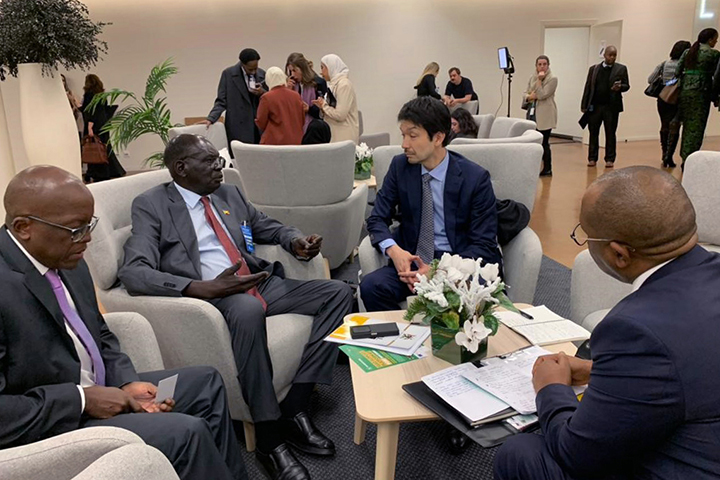
Senior Director Murotani (second from right) talks with other participants at the forum.
JICA has been promoting capacity development and institution building in Uganda in order to achieve peaceful coexistence between refugees and host communities. A capacity development project to enhance rice production, which has been implemented for many years, has expanded its beneficiaries to include refugees. The project aims to improve the livelihoods of both refugees and host communities by supporting refugees in the acquisition of cultivation techniques. Uganda is generous in its refugee-acceptance policies and offers refugees freedom of movement and employment. It has accepted approximately 1.5 million refugees from neighboring countries such as the Democratic Republic of Congo and South Sudan, making it the largest refugee-hosting country in Africa.
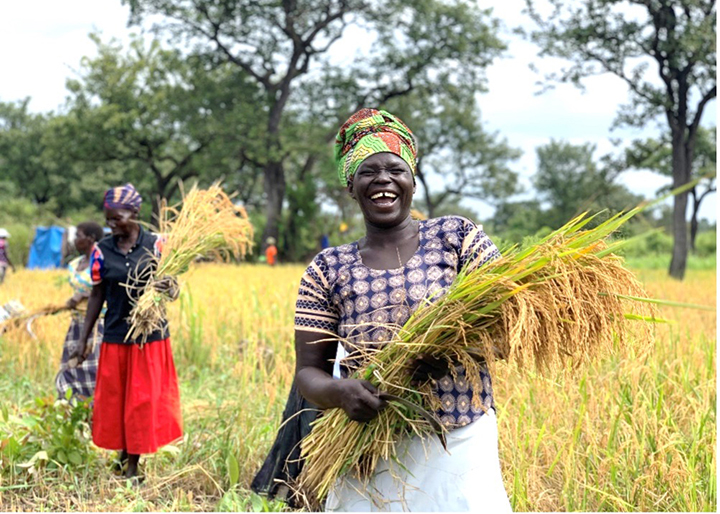
Refugees in Uganda taking part in a project that teaches rice cultivation techniques.
The increase in the number of refugees in Uganda has occasionally caused friction with local host communities. Some are concerned about the influx of refugees at hospitals, while others are concerned that the schools built for refugees are better than local schools. The government is now taking the initiative in integrating all operations of the entire region’s health facilities and schools, including those in refugee settlements. This creates a system that ensures equal access to government services for everyone, refugees and members of host communities alike, improving everyone’s living conditions.
Murotani spoke about the importance of cooperation. “By listening carefully to the opinions of both refugees and host communities and connecting them to local governments,” he said, “we are working to create an environment in which everyone can access good public services and use their own capacity to improve their lives. This is the role that JICA can play, as a development partner with experience that has supported refugees in Uganda for many years.”
One initiative that attracted attention at this year’s GRF was the Mental Health and Psychosocial Support (MHPSS) program for refugees. As refugees are forced to live away from home for longer periods, it is becoming increasingly necessary to offer comprehensive psychological support tailored to local conditions, especially for young people.
From 2022, JICA has been conducting a survey on psychosocial care for both Syrian refugees in Türkiye and youths in the host communities. When the Türkiye-Syria earthquake occurred in February 2023, JICA launched a pilot activity for building psychosocial support capacity, prioritizing affected areas where psychosocial care was quickly needed. The areas affected by the earthquake were also places that host many refugees.
One of the earthquake-stricken areas in Türkiye.
The Syrian civil war has led to Türkiye becoming one of the world's largest host countries, currently hosting 3.7 million refugees. There is an overwhelming shortage of psychosomatic and psychiatric doctors in the country given the number of refugees. It is important to raise people’s awareness regarding how to properly respond to mentally stressed persons in order to prevent those with stress and anxiety from becoming seriously ill. The country's Ministry of Youth and Sports runs diverse programs for the healthy development of youth in the country, including refugees. Through the ministry, JICA ran a training program for trainers of Psychological First Aid (PFA). The training was followed by the establishment of a system to disseminate basic skills among youth center staff and others.
The training was led by Professor Tsutsumi Atsuro of Kanazawa University and Dr. Tanaka Eizaburo, a psychiatrist and specially appointed lecturer at the University of Tokyo. Both have experience in psychological care in disaster-stricken areas in Japan and abroad.
Dr. Tanaka reflected on the training program and its effect. “The challenges of MHPSS are that it cannot be solved overnight, and the results are difficult to visualize,” he said. “It is important to plan projects from a long-term perspective with measurable results. All countries have a high potential need for MHPSS, and a desire to address it. Collaborating with professionals in the field is crucial.”
Training to disseminate methods of psychological first aid (PFA), Türkiye, July 2023.
Murotani believes that, for development partners, refugee assistance is about opening up the potential that is usually closed to refugees. “Communities that host refugees are also working with them to expand their possibilities,” he says. “At the Global Refugee Forum, we heard numerous stories of refugees who gained education and employment opportunities and are now active in their fields. Regardless of their situation, everyone should be able to pursue their own potential and maximize their capabilities so that they can be an agent for further development and live with dignity. This also matches the principles of human security.”
Cooperation among various partners, not only international humanitarian agencies and development partners but also the private sector, is essential. JICA is presently compiling the experiences and lessons learned in Uganda (where the national development plan is premised on living together with refugees) into guidance for other countries to implement cooperation.
With the number of people globally displaced from their homes in excess of 100 million, the time has come for everyone to face the refugee issue from their own perspective and take action by contributing in their own ways.
scroll